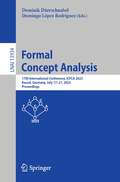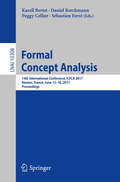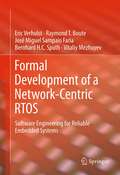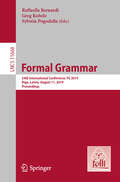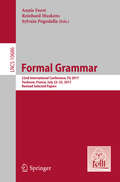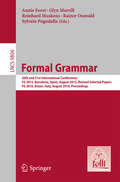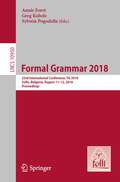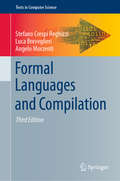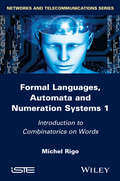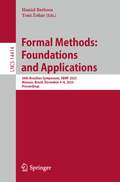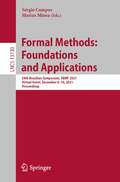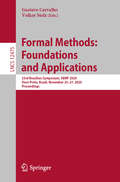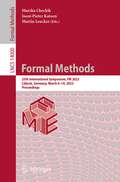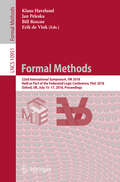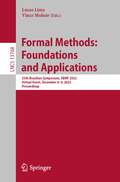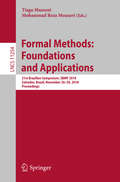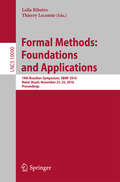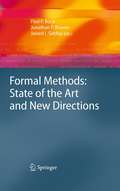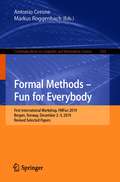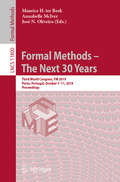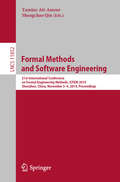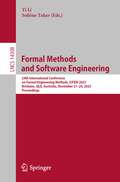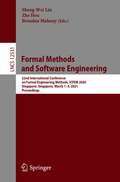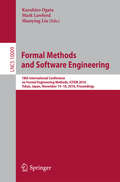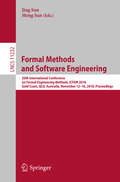- Table View
- List View
Formal Concept Analysis: 17th International Conference, ICFCA 2023, Kassel, Germany, July 17–21, 2023, Proceedings (Lecture Notes in Computer Science #13934)
by Dominik Dürrschnabel Domingo López RodríguezThis book constitutes the proceedings of the 17th International Conference on Formal Concept Analysis, ICFCA 2023, which took place in Kassel, Germany, in July 2023.The 13 full papers presented in this volume were carefully reviewed and selected from 19 submissions. The International Conference on Formal Concept Analysis serves as a platform for researchers from FCA and related disciplines to showcase and exchange their research findings. The papers are organized in two topical sections, first "Theory" and second "Applications and Visualization".
Formal Concept Analysis: 14th International Conference, ICFCA 2017, Rennes, France, June 13-16, 2017, Proceedings (Lecture Notes in Computer Science #10308)
by Karell Bertet, Daniel Borchmann, Peggy Cellier and Sébastien FerréThis book constitutes the proceedings of the 14th International Conference on Formal Concept Analysis, ICFCA 2017, held in Rennes, France, in June 2017. The 13 full papers presented in this volume were carefully reviewed and selected from 37 submissions. The book also contains an invited contribution and a historical paper translated from German and originally published in “Die Klassifkation und ihr Umfeld”, edited by P. O. Degens, H. J. Hermes, and O. Opitz, Indeks-Verlag, Frankfurt, 1986.The field of Formal Concept Analysis (FCA) originated in the 1980s in Darmstadt as a subfield of mathematical order theory, with prior developments in other research groups. Its original motivation was to consider complete lattices as lattices of concepts, drawing motivation from philosophy and mathematics alike. FCA has since then developed into a wide research area with applications much beyond its original motivation, for example in logic, data mining, learning, and psychology.
Formal Development of a Network-Centric RTOS
by Eric Verhulst José Miguel Faria Raymond T. Boute Vitaliy Mezhuyev Bernhard H.C. SputhMany systems, devices and appliances used routinely in everyday life, ranging from cell phones to cars, contain significant amounts of software that is not directly visible to the user and is therefore called "embedded". For coordinating the various software components and allowing them to communicate with each other, support software is needed, called an operating system (OS). Because embedded software must function in real time (RT), a RTOS is needed. This book describes a formally developed, network-centric Real-Time Operating System, OpenComRTOS. One of the first in its kind, OpenComRTOS was originally developed to verify the usefulness of formal methods in the context of embedded software engineering. Using the formal methods described in this book produces results that are more reliable while delivering higher performance. The result is a unique real-time concurrent programming system that supports heterogeneous systems with just 5 Kbytes/node. It is compatible with safety related engineering standards, such as IEC61508.
Formal Grammar: 24th International Conference, FG 2019, Riga, Latvia, August 11, 2019, Proceedings (Lecture Notes in Computer Science #11668)
by Raffaella Bernardi Greg Kobele Sylvain PogodallaEdited in collaboration with FoLLI, the Association of Logic, Language and Information, this book constitutes the refereed proceedings of the 24th International Conference on Formal Grammar, FG 2019, held in Riga, Latvia, in August 2019, in conjunction with the 31st European Summer School in Logic, Language and Information, ESSLI 2019.The 7 full papers presented were carefully reviewed and selected from 11 submissions. They present new and original research on formal grammar, mathematical linguistics, and the application of formal and mathematical methods to the study of natural language and focus on topics such as formal and computational phonology, morphology, syntax, semantics, and pragmatics; model-theoretic and proof-theoretic methods in linguistics; logical aspects of linguistic structure; constraint-based and resource-sensitive approaches to grammar; learnability of formal grammar; integration of stochastic and symbolic models of grammar; foundational, methodological, and architectural issues in grammar and linguistics; and mathematical foundations of statistical approaches to linguistic analysis.
Formal Grammar: 22nd International Conference, FG 2017, Toulouse, France, July 22-23, 2017, Revised Selected Papers (Lecture Notes in Computer Science #10686)
by Annie Foret Reinhard Muskens Sylvain PogodallaEdited in collaboration with FoLLI, the Association of Logic, Language and Information, this book constitutes the refereed proceedings of the 22nd International Conference on Formal Grammar, FG 2017, collocated with the European Summer School in Logic, Language and Information in July 2017. The 9 contributed papers were carefully reviewed and selected from 14 submissions.The focus of papers are as follows: Formal and computational phonology, morphology, syntax, semantics and pragmatics Model-theoretic and proof-theoretic methods in linguistics Logical aspects of linguistic structure Constraint-based and resource-sensitive approaches to grammar Learnability of formal grammar Integration of stochastic and symbolic models of grammar Foundational, methodological and architectural issues in grammar and linguistics Mathematical foundations of statistical approaches to linguistic analysis
Formal Grammar
by Rainer Osswald Annie Foret Glyn Morrill Reinhard Muskens Sylvain PogodallaThis book constitutes the refereed proceedings of the 19 International Conference on Formal Grammar 2014, collocated with the European Summer School in Logic, Language and Information in August 2014. The 10 revised full papers presented together with 2 invited contributions were carefully reviewed and selected from a total of 19 submissions. Traditionally linguistics has been studied from the point of view of the arts, humanities and letters, but in order to make concrete ideas which might otherwise be fanciful the study of grammar has been increasingly subject to the rigours of computer science and mathematization i. e. articulation in the language of science.
Formal Grammar 2018: 23rd International Conference, FG 2018, Sofia, Bulgaria, August 11-12, 2018, Proceedings (Lecture Notes in Computer Science #10950)
by Annie Foret Greg Kobele Sylvain PogodallaEdited in collaboration with FoLLI, the Association of Logic, Language and Information, this book constitutes the refereed proceedings of the 23rd International Conference on Formal Grammar, FG 2018, collocated with the European Summer School in Logic, Language and Information in August 2018. The 7 full papers were carefully reviewed and selected from 11 submissions.The focus of papers are as follows: Formal and computational phonology, morphology, syntax, semantics, andpragmatics Model-theoretic and proof-theoretic methods in linguistics Logical aspects of linguistic structure Constraint-based and resource-sensitive approaches to grammar Learnability of formal grammar Integration of stochastic and symbolic models of grammar Foundational, methodological, and architectural issues in grammar and linguistics Mathematical foundations of statistical approaches to linguistic analysis
Formal Languages and Compilation (Texts in Computer Science)
by Stefano Crespi Reghizzi Luca Breveglieri Angelo MorzentiThis classroom-tested and clearly-written textbook presents a focused guide to the conceptual foundations of compilation, explaining the fundamental principles and algorithms used for defining the syntax of languages, and for implementing simple translators. <P><P> This significantly updated and expanded third edition has been enhanced with additional coverage of regular expressions, visibly pushdown languages, bottom-up and top-down deterministic parsing algorithms, and new grammar models. <P><P> Topics and features: describes the principles and methods used in designing syntax-directed applications such as parsing and regular expression matching; covers translations, semantic functions (attribute grammars), and static program analysis by data flow equations; introduces an efficient method for string matching and parsing suitable for ambiguous regular expressions (NEW); presents a focus on extended BNF grammars with their general parser and with LR(1) and LL(1) parsers (NEW); introduces a parallel parsing algorithm that exploits multiple processing threads to speed up syntax analysis of large files; discusses recent formal models of input-driven automata and languages (NEW); includes extensive use of theoretical models of automata, transducers and formal grammars, and describes all algorithms in pseudocode; contains numerous illustrative examples, and supplies a large set of exercises with solutions at an associated website. <P><P> Advanced undergraduate and graduate students of computer science will find this reader-friendly textbook to be an invaluable guide to the essential concepts of syntax-directed compilation. The fundamental paradigms of language structures are elegantly explained in terms of the underlying theory, without requiring the use of software tools or knowledge of implementation, and through algorithms simple enough to be practiced by paper and pencil.
Formal Languages, Automata and Numeration Systems 1: Introduction to Combinatorics on Words
by Michel RigoFormal Languages, Automaton and Numeration Systems presents readers with a review of research related to formal language theory, combinatorics on words or numeration systems, such as Words, DLT (Developments in Language Theory), ICALP, MFCS (Mathematical Foundation of Computer Science), Mons Theoretical Computer Science Days, Numeration, CANT (Combinatorics, Automata and Number Theory). Combinatorics on words deals with problems that can be stated in a non-commutative monoid, such as subword complexity of finite or infinite words, construction and properties of infinite words, unavoidable regularities or patterns. When considering some numeration systems, any integer can be represented as a finite word over an alphabet of digits. This simple observation leads to the study of the relationship between the arithmetical properties of the integers and the syntactical properties of the corresponding representations. One of the most profound results in this direction is given by the celebrated theorem by Cobham. Surprisingly, a recent extension of this result to complex numbers led to the famous Four Exponentials Conjecture. This is just one example of the fruitful relationship between formal language theory (including the theory of automata) and number theory.
Formal Methods: 26th Brazilian Symposium, SBMF 2023, Manaus, Brazil, December 4–8, 2023, Proceedings (Lecture Notes in Computer Science #14414)
by Haniel Barbosa Yoni ZoharThis book constitutes the refereed proceedings of the 26th Brazilian Symposium on Formal Methods, SBMF 2023, held in Manaus, Brazil, during December 4-8, 2023.The 7 full papers and 2 short papers presented in this book were carefully reviewed and selected from 16 submissions.The papers are divided into the following topical sections: specification and modeling languages; testing; and verification and validation.
Formal Methods: 24th Brazilian Symposium, SBMF 2021, Virtual Event, December 6–10, 2021, Proceedings (Lecture Notes in Computer Science #13130)
by Sérgio Campos Marius MineaThis book constitutes the refereed proceedings of the 24rd Brazilian Symposium on Formal Methods, SBMF 2021, which was held in December 2021. Due to COVID 19-pandemic it took place virtually. The 8 regular papers presented in this book were carefully reviewed and selected from 15 submissions. The papers detail the development, dissemination, and use of formal methods for the construction of high-quality computational systems, aiming to promote opportunities for researchers and practitioners with an interest in formal methods to discuss the recent advances in this area
Formal Methods: 23rd Brazilian Symposium, SBMF 2020, Ouro Preto, Brazil, November 25–27, 2020, Proceedings (Lecture Notes in Computer Science #12475)
by Gustavo Carvalho Volker StolzThis book constitutes the refereed proceedings of the 23rd Brazilian Symposium on Formal Methods, SBMF 2020, which was supposed to take place in Ouro Preto, Brazil, in November 2020. Instead the symposium took place virtually due to the COVID-19 pandemic. The 10 regular papers presented together with 3 invited talks in this book were carefully reviewed and selected from 17 submissions. The papers are organized in topical sections such as: experience reports; models, languages and semantics; and software product lines.Chapter ‘Safety Assurance of a High Voltage Controller for an Industrial Robotic System’ is available open access under a Creative Commons Attribution 4.0 International License via link.springer.com.
Formal Methods: 25th International Symposium, FM 2023, Lübeck, Germany, March 6–10, 2023, Proceedings (Lecture Notes in Computer Science #14000)
by Marsha Chechik Joost-Pieter Katoen Martin LeuckerThis book constitutes the refereed proceedings of the 25th International Symposium on Formal Methods, FM 2023, which took place in Lübeck, Germany, in March 2023. The 26 full paper, 2 short papers included in this book were carefully reviewed and selected rom 95 submissions. They have been organized in topical sections as follows: SAT/SMT; Verification; Quantitative Verification; Concurrency and Memory Models; Formal Methods in AI; Safety and Reliability. The proceedings also contain 3 keynote talks and 7 papers from the industry day.
Formal Methods: 22nd International Symposium, FM 2018, Held as Part of the Federated Logic Conference, FloC 2018, Oxford, UK, July 15-17, 2018, Proceedings (Lecture Notes in Computer Science #10951)
by Klaus Havelund Jan Peleska Bill Roscoe Erik De VinkThis book constitutes the refereed proceedings of the 22nd International Symposium on Formal Methods, FM 2018, held in Oxford, UK, in July 2018.The 44 full papers presented together with 2 invited papers were carefully reviewed and selected from 110 submissions. They present formal methods for developing and evaluating systems. Examples include autonomous systems, robots, and cyber-physical systems in general. The papers cover a broad range of topics in the following areas: interdisciplinary formal methods; formal methods in practice; tools for formal methods; role of formal methods in software systems engineering; and theoretical foundations.
Formal Methods: 25th Brazilian Symposium, SBMF 2022, Virtual Event, December 6–9, 2022, Proceedings (Lecture Notes in Computer Science #13768)
by Lucas Lima Vince MolnárThis book constitutes the refereed proceedings of the 25th Brazilian Symposium on Formal Methods, SBMF 2022, which was held virtually in December 2022. The 8 regular papers presented in this book were carefully reviewed and selected from 15 submissions. The symposium focuses on the development, dissemination, and use of formal methods for the construction of high-quality computational systems, aiming to promote opportunities for researchers and practitioners with an interest in formal methods to discuss the recent advances in this area.
Formal Methods: 21st Brazilian Symposium, SBMF 2018, Salvador, Brazil, November 26–30, 2018, Proceedings (Lecture Notes in Computer Science #11254)
by Tiago Massoni Mohammad Reza MousaviThis book constitutes the refereed proceedings of the 21st Brazilian Symposium on Formal Methods, SBMF 2018, which took place in Salvador, Brazil, in November 2018.The 16 regular papers presented in this book were carefully reviewed and selected from 30 submissions. The papers are organized in topical sections such as: techniques and methodologies; specification and modeling languages; theoretical foundations; verification and validation; experience reports regarding teaching formal methods; and applications.Chapter “TeSSLa: Temporal Stream-Based Specification Language” is available open access under a Creative Commons Attribution 4.0 International License via link.springer.com.
Formal Methods: Foundations and Applications
by Leila Ribeiro Thierry LecomteThis book constitutes the refereed proceedings of the 19th Brazilian Symposium on Formal Methods, SBMF 2016, which took place in Natal, Brazil, in November 2016. The 12 papers presented together with two invited talks were carefully reviewed and selected from 22 submissions. They are organized in the following topical sections: analysis and verification; modeling and logic; and model checking.
Formal Methods: State of the Art and New Directions
by Jawed Siddiqi Paul Boca Jonathan P. BowenThe last decade has witnessed a modest but sustained increase in researching and applying formal methods. A number of well cited success stories are now available and provide strong evidence that formal methods can be effective and deployed in industrial-scale applications. Through fundamental contributions from leading researchers, this book provides further evidence of the use of formal methods in the areas of requirements, design, modelling and implementation, verification and validation. The self-contained chapters are views from experts in these areas, providing readers with rich background information and a diverse breadth of specialist material. This authoritative collection of views provides a snapshot of the field and will be of considerable interest to researchers and professionals seeking a perspective on fundamental underpinnings of formal methods and current hot topics in the field. The following website www.fmsand.info is associated with the book.
Formal Methods – Fun for Everybody: First International Workshop, FMFun 2019, Bergen, Norway, December 2–3, 2019, Revised Selected Papers (Communications in Computer and Information Science #1301)
by Antonio Cerone Markus RoggenbachThis volume constitutes the post-workshop proceedings of the First International Workshop on Formal Methods – Fun for Everybody, FMFun 2019, held in Bergen, Norway, in December 2019.The 7 revised full papers and 2 revised short papers presented in this volume were carefully reviewed and selected from 15 submissions. A white paper and two keynote papers are also included. The papers explore ways of utilizing the pathway to transforming and spreading formal methods. The vision of this workshop series is that formal methods ought to be taught in such a way that every student can have fun with it.
Formal Methods – The Next 30 Years: Third World Congress, FM 2019, Porto, Portugal, October 7–11, 2019, Proceedings (Lecture Notes in Computer Science #11800)
by Maurice H. ter Beek Annabelle McIver José N. OliveiraThis book constitutes the refereed proceedings of the 23rd Symposium on Formal Methods, FM 2019, held in Porto, Portugal, in the form of the Third World Congress on Formal Methods, in October 2019. The 44 full papers presented together with 3 invited presentations were carefully reviewed and selected from 129 submissions. The papers are organized in topical sections named: Invited Presentations; Verification; Synthesis Techniques; Concurrency; Model Checking Circus; Model Checking; Analysis Techniques; Specification Languages; Reasoning Techniques; Modelling Languages; Learning-Based Techniques and Applications; Refactoring and Reprogramming; I-Day Presentations.
Formal Methods and Software Engineering: 21st International Conference on Formal Engineering Methods, ICFEM 2019, Shenzhen, China, November 5–9, 2019, Proceedings (Lecture Notes in Computer Science #11852)
by Yamine Ait-Ameur Shengchao QinThis book constitutes the proceedings of the 21st International Conference on Formal Engineering Methods, ICFEM 2019, held in Shenzhen, China, in November 2019. The 28 full and 8 short papers presented in this volume were carefully reviewed and selected from 94 submissions. They deal with the recent progress in the use and development of formal engineering methods for software and system design and record the latest development in formal engineering methods.
Formal Methods and Software Engineering: 24th International Conference on Formal Engineering Methods, ICFEM 2023, Brisbane, QLD, Australia, November 21–24, 2023, Proceedings (Lecture Notes in Computer Science #14308)
by Yi Li Sofiène TaharThis book constitutes the proceedings of the 24th International Conference on Formal Methods and Software Engineering, ICFEM 2023, held in Brisbane, QLD, Australia, during November 21–24, 2023.The 13 full papers presented together with 8 doctoral symposium papers in this volume were carefully reviewed and selected from 34 submissions, the volume also contains one invited paper. The conference focuses on applying formal methods to practical applications and presents papers for research in all areas related to formal engineering methods.
Formal Methods and Software Engineering: 22nd International Conference on Formal Engineering Methods, ICFEM 2020, Singapore, Singapore, March 1–3, 2021, Proceedings (Lecture Notes in Computer Science #12531)
by Shang-Wei Lin Zhe Hou Brendan MahoneyThis book constitutes the proceedings of the 22nd International Conference on Formal Engineering Methods, ICFEM 2020, held in Singapore, Singapore, in March 2021. The 16 full and 4 short papers presented together with 1 doctoral symposium paper in this volume were carefully reviewed and selected from 41 submissions. The papers cover theory and applications in formal engineering methods together with case studies. They also represent the recent development in the use and development of formal engineering methods for software and system development.
Formal Methods and Software Engineering
by Shaoying Liu Mark Lawford Kazuhiro OgataThis book constitutes the refereed proceedings of the 18th International Conference on Formal Engineering Methods, ICFEM 2016, held in Tokyo, Japan, in November 2016. The 27 revised full papers presented together with three invited talks were carefully reviewed and selected from 64 submissions. The conference focuses in all areas related to formal engineering meth-ods, such as verification and validation, software engineering, formal specification and modeling, software security, and software reliability.
Formal Methods and Software Engineering: 20th International Conference on Formal Engineering Methods, ICFEM 2018, Gold Coast, QLD, Australia, November 12-16, 2018, Proceedings (Lecture Notes in Computer Science #11232)
by Jing Sun Meng SunThis book constitutes the refereed proceedings of the 20th International Conference on Formal Engineering Methods, ICFEM 2018, held in Gold Coast, QLD, Australia, in November 2018. The 22 revised full papers presented together with 14 short papers were carefully reviewed and selected from 66 submissions. The conference focuses on all areas related to formal engineering methods, such as verification; network systems; type theory; theorem proving; logic and semantics; refinement and transition systems; and emerging applications of formal methods.
